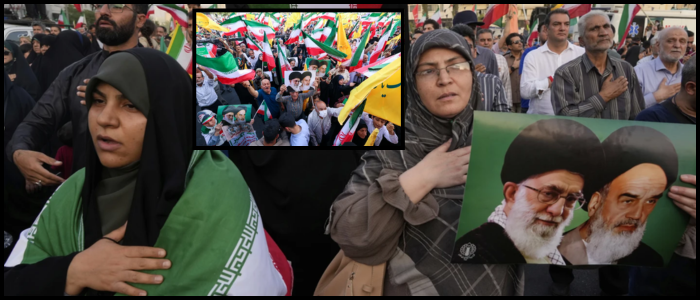In just the past week, six Iranians have been executed, accused of spying for Israel, since the Israeli attacks began on June 13, including three on one day. Human rights advocates see in these executions the beginning of a broader crackdown, an effort to silence the critics and obscure the military reversals of the country. Mahmood Amiry Moghaddam, who leads the Iran Human Rights Organization, cautioned that possibly hundreds — or even thousands — of prisoners now risk being executed.
Residents, fearing retaliation, spoke anonymously or used only their first names as they expressed their fears. "Every time there is a crisis, the regime makes the people pay," said Nooshin, a housewife in Tehran. Others like Shirin, worried that the state could "release all their anger" on common citizens.
After a surprise American-brokered ceasefire brought an end to a 12-day war with Israel, Iranians are unclear about what happens next. As neighbourhoods in Tehran and other cities begin to recover from Israeli airstrikes, the fear is growing that the Iranian government, having survived the Israeli onslaught, will turn inward, ratcheting up the repression against its own people.
In just the past week, six Iranians have been executed, accused of spying for Israel, since the Israeli attacks began on June 13, including three on one day. Human rights advocates see in these executions the beginning of a broader crackdown, an effort to silence the critics and obscure the military reversals of the country. Mahmood Amiry Moghaddam, who leads the Iran Human Rights Organization, cautioned that possibly hundreds — or even thousands — of prisoners now risk being executed.
Residents, fearing retaliation, spoke anonymously or used only their first names as they expressed their fears. "Every time there is a crisis, the regime makes the people pay," said Nooshin, a housewife in Tehran. Others like Shirin, worried that the state could "release all their anger" on common citizens.
Information Gaps and Divided Public
The internet went on and off during the uprising - news and information became unavailable. Iran's state media propagated patriotic messages, reframing detailed discussions of the damage or internal unrest elsewhere in the region as fanciful, fake news. In a rare public admission, Elias Hazrati, a senior media figure with ties to President Masoud Pezeshkian, recognized that deep political divisions were at play and called for unity in the face of outside threats.
Still, uncertainty lingers. "There are terrible things going on in the government, that we have no idea about," said Shirin, in northern Tehran.
Mike Segar/Reuters A New York that Could Return "If you can make it here, you can make it anywhere" read the signs welcoming newcomers to the city.
Not all citizens are pessimistic. Mahshid, from Qazvin, said she felt the government might continue to relax social controls, including the rule that makes women cover their hair. Others have heard unconfirmed reports that curbs on platforms such as Instagram and WhatsApp might be loosened.
One academic researcher in Tehran said the war had weakened the authorities, who now faced heightened constraints on social repression. "It's not that the Islamic Republic is going to get more hard-line," he said, noting that public resistance to the most stringent measures is strong.
Still, infrastructure challenges continue. One strike in a central district of Tehran left residents without water for days, and the electricity blackouts, which have long been widespread, have since been a continuing irritant.
And although the war has ended, tensions linger. Even as hard-liners dance in the street and declare victory, many Iranians are turning a critical eye toward the conflict, and worry about the damage it will do long term. "More than half the country didn't want this war," the researcher said. The internet went on and off during the uprising - news and information became unavailable. Iran's state media propagated patriotic messages, reframing detailed discussions of the damage or internal unrest elsewhere in the region as fanciful, fake news. In a rare public admission, Elias Hazrati, a senior media figure with ties to President Masoud Pezeshkian, recognized that deep political divisions were at play and called for unity in the face of outside threats.
Still, uncertainty lingers. "There are terrible things going on in the government, that we have no idea about," said Shirin, in northern Tehran.
Mike Segar/Reuters A New York that Could Return "If you can make it here, you can make it anywhere" read the signs welcoming newcomers to the city.
Not all citizens are pessimistic. Mahshid, from Qazvin, said she felt the government might continue to relax social controls, including the rule that makes women cover their hair. Others have heard unconfirmed reports that curbs on platforms such as Instagram and WhatsApp might be loosened.
One academic researcher in Tehran said the war had weakened the authorities, who now faced heightened constraints on social repression. "It's not that the Islamic Republic is going to get more hard-line," he said, noting that public resistance to the most stringent measures is strong.
Still, infrastructure challenges continue. One strike in a central district of Tehran left residents without water for days, and the electricity blackouts, which have long been widespread, have since been a continuing irritant.
And although the war has ended, tensions linger. Even as hard-liners dance in the street and declare victory, many Iranians are turning a critical eye toward the conflict, and worry about the damage it will do long term. "More than half the country didn't want this war," the researcher said.
World

After Ceasefire, Iranians Worry About What Comes Next

After a surprise American-brokered ceasefire brought an end to a 12-day war with Israel, Iranians are unclear about what happens next. As neighbourhoods in Tehran and other cities begin to recover from Israeli airstrikes, the fear is growing that the Iranian government, having survived the Israeli onslaught, will turn inward, ratcheting up the repression against its own people.















